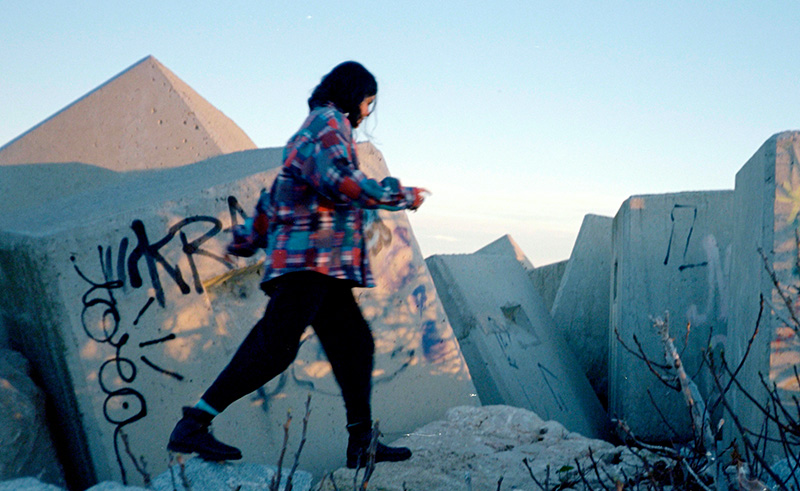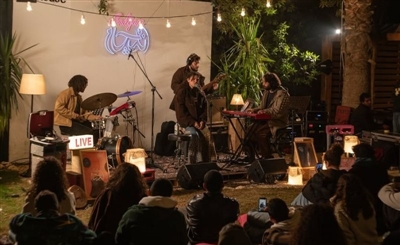Sabine Salamé Takes Us Through Immigration on Taffe Daw Album
Up-and-coming Lebanese hip hop artist Sabine Salamé takes us through the emotional journey of finding home in her latest 10-track Album in collaboration with producer Jawad Nawfal.

In the dynamic landscape of Arabic Hip Hop, a unique voice has emerged that's breaking down the genre and stripping it to its core. Sabine Salamé, a Lebanese rapper and poet, embodies this essence with her collaborative work ‘Taffe Daw…’ alongside Lebanese producer Jawad Nawfal (Munma). Comprising ten heartfelt tracks, the album takes listeners on a ride through Sabine’s emotional stages of immigration. In its blend of musical styles and honest storytelling, Salamé creates something that goes beyond just a collection of songs; it's a reflection of Salamé's own experiences as she transforms the complex emotions of migration into a musical narrative.
"The longer I spent abroad, the harder it became for me to fit in back home. Eventually, I reached a stage where I didn't feel like I belonged anywhere anymore. I continue to float around spaces like a ghost, not calling anywhere home, not being anywhere long enough to build a life. We see in the album this dissociation and realize that this music, and the work that I do, is the only place where I find myself."
‘Taffe Daw…’ invites us to step into her world and experience the ups and downs of starting anew. Each track feels like a chapter, building a bigger picture of what it's like to leave one world behind and step into another. Munma merges samples of old Arabic tracks with modular music and samples of home recordings from Sabine to integrate different sounds that could express the different emotional situations described.
“The process started with us discussing a variety of situations, objects and feelings to integrate into the sounds. In ‘Bas le3eb’ for example, I had Munma going around the house recording different doors and windows being violently closed. I wanted to integrate that feeling of “closed doors” but mostly the violence in having a door shut in your face.”
In the song ‘Al Chanta’, Salamé captures the confusion of not having a fixed place to call home. The track speaks to the uncertainty and frustration of not knowing where you truly belong, striking a chord with anyone who has felt lost in a new environment.
One of the striking aspects of Salamé's approach is her use of dark humor. It's not just about being serious; it's about finding a way to cope with the challenges life throws at you. In ‘Ana Khalas’, for instance, she combines light-hearted tones with deeper reflections on personal struggles. It's a reminder that life isn't all dark or all light – it's a mix of both, and we navigate it the best we can.-19e68747-cd4a-4302-9975-1a4d98f650e9.jpg) "Humor has always been my defense mechanism against the world, but also against anxiety. I don't necessarily see this as a way of conveying resilience. In some cases, this has put me in difficult situations in real life. But when it comes to music, I believe that this could help other people deal with their issues easier. When we give ourselves permission to laugh at ourselves, things feel lighter, and when the world is so dark around us, that's when we need to laugh the most."
"Humor has always been my defense mechanism against the world, but also against anxiety. I don't necessarily see this as a way of conveying resilience. In some cases, this has put me in difficult situations in real life. But when it comes to music, I believe that this could help other people deal with their issues easier. When we give ourselves permission to laugh at ourselves, things feel lighter, and when the world is so dark around us, that's when we need to laugh the most."
Sabine's creative journey is far from confined to this singular achievement. Within her recent album ‘Living with Survival’, Sabine offers a window into the emotional and psychological landscape she navigated during her six-year sojourn in Beirut city. This collection is a daring attempt to distill a myriad of emotions: nostalgia, depression, dissociation, anger, numbness, and fleeting sparks of hope that flickered amid the tumultuous backdrop of the October uprising. The album uses a range of musical genres to mirror these complex feelings, each track weaving a tapestry of mood. Notably, the album's closing track, ‘Dejdej Ta3ta3’, serves as a testament to Sabine's innovation – co-produced by Sabine with the unconventional use of utensils and appliances from her own kitchen, it underscores her commitment to translating raw emotion into artistic expression.
The track ‘Box within a Box’, from ‘Living with Survival’, showcases Sabine’s musical versatility. The song captures the turbulence and complexity of her themes, and the accompanying animated video adds another layer to the experience of living in Beirut.
In a world that often emphasizes barriers, Sabine Salame dismantles them by turning her vulnerability into creative expression. Salamé's album reminds us that, despite our differences, we share common emotions and struggles. Through her art, she invites us to engage in conversations about identity, immigration, and the human spirit. Sabine crafted an album that not only tells her story, but also resonates with anyone who's faced similar challenges. ‘Taffe Daw…’ isn't just a collection of ego-fueled Hip Hop tracks; it's a reflection of her own experiences, a reflection of her strength and her ability to find light in the midst of the obstacles she faced.
Salamé's vulnerability shines through, reminding us that every track is a piece of her heart and a mirror for the emotions we all navigate in our lives. With this album, Salamé extends an invitation – to find fragments of our own stories within her verses. Through her themes, her humor, and her lyrical talent, Salamé encourages us to join her on this journey – a journey that intertwines her personal narrative with our shared humanity.
Trending This Month
-
Jan 29, 2026
-
Feb 20, 2026






















